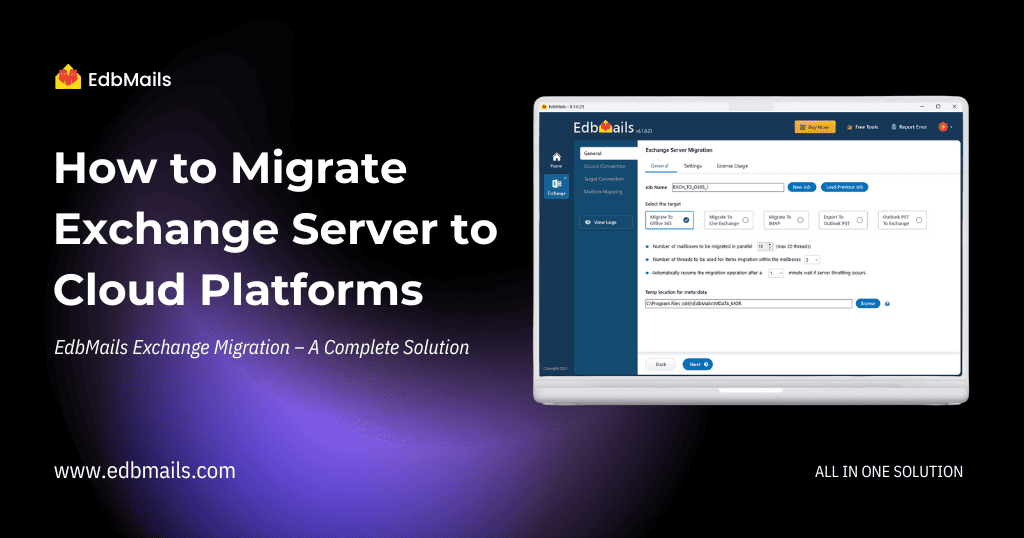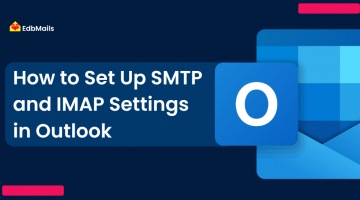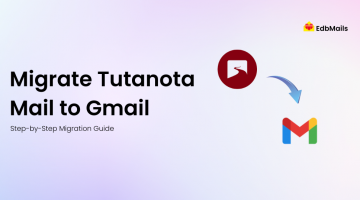Many organizations are moving to the cloud to take advantage of its numerous benefits. Cloud migration has become a key business trend, driven by the need for flexibility, scalability, and cost efficiency. The cloud not only provides a secure environment for storing and managing critical business data but also enables remote collaboration, faster deployments, and reduced dependency on on-premise infrastructure. For enterprises of all sizes, migrating Exchange Server to the cloud offers a future-ready platform that ensures business continuity and supports long-term growth.

Reasons to Migrate Exchange Server to the Cloud
1. High Reliability
By migrating Exchange to the cloud, emails remain accessible without interruptions, eliminating the need to maintain on-premises hardware. Leading cloud providers compete to deliver maximum uptime, so choosing a well-established partner ensures higher productivity and consistent service availability.
2. Enhanced Security
With Microsoft 365, even small and medium-sized businesses gain access to enterprise-grade security. Microsoft invests heavily in its global data centers, ensuring geo-redundancy, advanced threat protection, and compliance with standards such as HIPAA, GDPR, and ISO 27001.
3. Cost Efficiency
Moving to the cloud reduces capital expenditures on servers and minimizes operational overhead. Subscription-based plans lower overall IT costs while delivering predictable pricing for organizations.
4. Flexibility
Office 365 offers flexible subscription models, allowing businesses to choose plans that best suit their needs. Organizations can easily adjust services as requirements change.
5. Scalability
Cloud-based Exchange eliminates the need for large upfront investments in infrastructure. Businesses can add or remove licenses instantly to match user demand, making it highly scalable.
6. Backup and Disaster Recovery
Microsoft ensures business continuity with built-in backup and disaster recovery options. In the event of natural disasters or system failures, administrators can configure retention policies and restore data seamlessly.
7. Always Up to Date
Cloud services deliver automatic updates, ensuring users have access to the latest features and security improvements without delays. This improves productivity and keeps organizations aligned with modern technology trends.
EdbMails Exchange Migration – A Complete Solution
While Microsoft provides several native methods for migrating Exchange to the cloud, many organizations find these approaches complex, time-intensive, and limited by factors such as mailbox size restrictions, potential downtime, and the need for advanced technical expertise.
A smarter alternative is to use a dedicated solution like EdbMails Exchange Migration, which streamlines the entire process. EdbMails enables a direct and secure migration from on-premises or hosted Exchange to Microsoft 365 (Office 365), ensuring zero data loss, minimal downtime, and a seamless transition tailored for businesses of every size.
Key Features of EdbMails Exchange Migration:
- Direct Migration: Move mailboxes, emails, contacts, calendars, and tasks directly to Microsoft 365 without complex configurations.
- Incremental Migration: Ensures that only new or updated items are migrated in subsequent attempts, preventing data duplication.
- Preserves Data Integrity: Maintains folder hierarchy, metadata, attachments, and permissions exactly as in the source mailbox.
- Supports Large Mailboxes: Easily handles large mailbox sizes and attachments without any restrictions.
- Advanced Filtering Options: Migrate selected mailboxes, folders, or specific items based on date, subject, or attachment.
- Secure and Compliant: Uses modern authentication (OAuth 2.0) with TLS encryption, ensuring compliance with Microsoft’s security standards.
- Ease of Use: Simple, user-friendly interface that reduces technical complexity, making it suitable for admins and IT teams alike.
By using EdbMails, businesses can overcome the challenges of manual migration and ensure a smooth, cost-effective, and future-ready transition to the cloud.
Wrapping Up
Migrating Exchange Server to the cloud offers organizations enhanced security, reliability, and scalability while reducing operational costs. Microsoft 365 provides a modern platform with built-in backup, compliance, and productivity features that support business growth.
Instead of struggling with complex native methods, EdbMails Exchange Migration ensures a direct, secure, and seamless transition. With features like incremental migration, large mailbox support, and data integrity preservation, EdbMails makes the move to the cloud simple and efficient for businesses of all sizes.
See our other articles:
🔗 What is the difference between Hosted Exchange and Exchange online?
🔗 Everything You Need to Know About Hosted Exchange to Office 365 Migration



